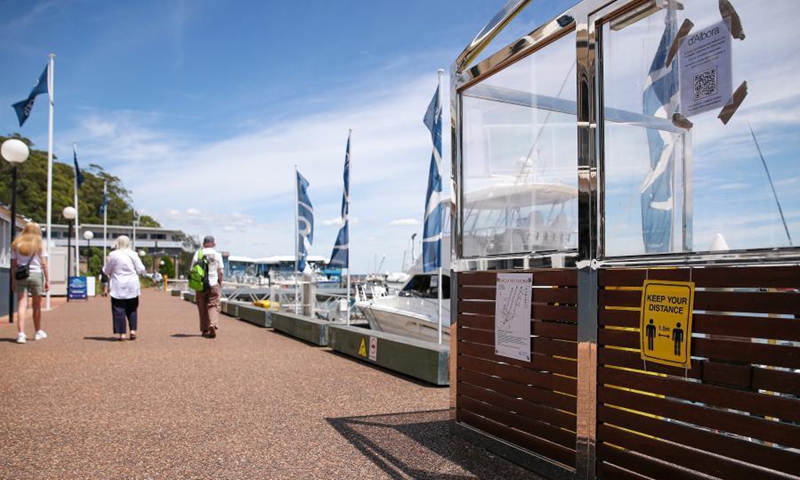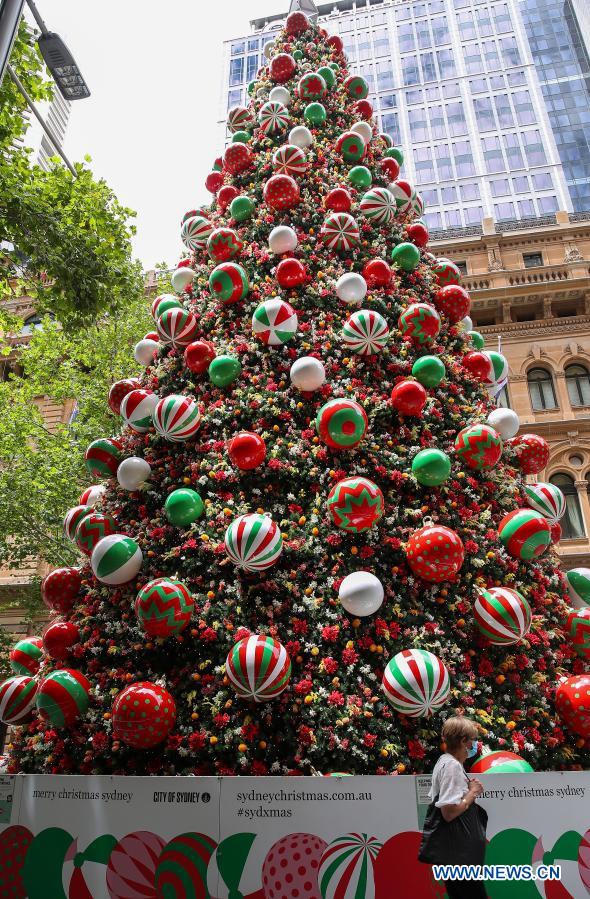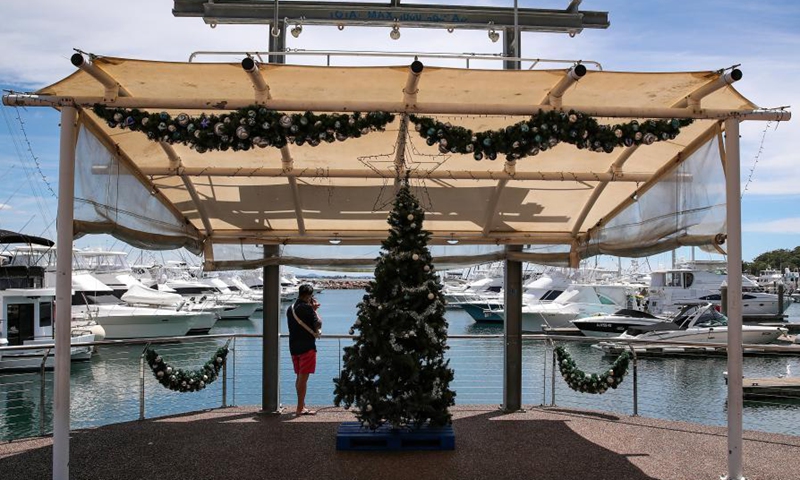Australians spend Christmas within locked state borders under COVID-19
Source: Xinhua Published: 2020/12/24 20:48:21

People walk at a tourist dock near New Castle, New South Wales State, Australia, Dec. 23, 2020. (Xinhua/Bai Xuefei)

A woman wearing a face mask walks past a Christmas tree at Martin Place in Sydney, Australia, Dec. 22, 2020. (Xinhua/Bai Xuefei)

A man talks on a phone at a tourist dock near New Castle, New South Wales State, Australia, Dec. 23, 2020. (Xinhua/Bai Xuefei)
Until last week, Australia appeared primed for a COVID-free Christmas. However, a large cluster of cases detected in Sydney has since forced a strict lockdown of the area and put state leaders around the country on high alert.
Traditionally Christmas in Australia is spent with family and friends, and many people take the opportunity to travel elsewhere in the country to reconnect with distant relatives.
However, as the Sydney cluster threatened to spread, recently reopened interstate borders were slammed shut again, barring residents from Australia's largest city from entering and throwing many people's plans into disarray.
By Christmas Eve the Sydney cluster had grown to over 100 cases, less than was feared but enough to warrant harsh restrictions on those within the outbreak area. State authorities split Sydney's Northern beaches into two sections, imposing a strict lockdown on the region where the cluster originated.
So far the State of New South Wales (NSW), of which Sydney is the capital, has named over 100 venues as being visited by a known case. Anyone who also attended during the same period is considered a close contact and required to self-isolate for 14 days whether they return a negative reading or not.
One of them is Paul, who is in his early thirties and lives on Sydney's Northern Beaches within the lockdown zone. He received a call from health authorities less than a week before Christmas informing him that he had been at a pub at the same time as somebody infected with the virus and would need to isolate.
Paul told Xinhua that he would be spending Christmas alone in a room at his parents house, with them providing him with food and other items while also remaining separated from him.
He said it was difficult knowing he would have to remain in isolation despite receiving a negative test result, although he understood the concern of health authorities that the virus could appear in some people later.
"I'd prefer not to, but considering I was a close contact it is in the best interest for everyone that I wait it out," Paul said.
"NSW Health have done a pretty good job at keeping low case numbers so I'm happy to abide by their guidelines."
Normally Paul spends Christmas morning with his direct family before heading off in the afternoon to a family friend's place for a larger gathering where they relax and enjoy more food and drink together.
"(This year) as I'm in isolation, I will be spending time in the back room of my parents place, beer in hand and most likely shouting through a window at my mum and dad."
The hardest part he says will be being separated from his long time partner who went into isolation at her parents house nearby.
"As we were both placed in Iso we decided to spend the time with our respective parents. So I won't see her for the next eight days," Paul said.
Another Sydney resident, David Wong, who lives outside the affected area, described making plans for Christmas as like "riding a roller coaster".
It is a tradition in Wong's family to travel out for the Christmas holiday. He had booked a very grand holiday plan in Queensland for this Christmas one year ahead, because his elder daughter will graduate from high school this summer.
They planned to drive to the Sunshine Coast with another friend's family on the eve of Christmas. However, with the outbreak of the cluster in Northern Beaches, his hope for a happy holiday has become increasingly vague.
"I kept swiping the news website last weekend, paying close attention to the change of border policies of other states. I even considered an earlier departure but I thought the situation may not be that bad," Wong told Xinhua.
However, with 30 new locally acquired cases recorded on Sunday, the neighboring state of Queensland tightened its border policy again, announcing those who want to enter Queensland from Greater Sydney since midnight of Dec. 21 have to apply for an exemption and go into a 14-day hotel quarantine at their own expense.
"In earlier November I used to feel desperate that I might need to cancel all the plan because Queensland had been reluctant to open its border to NSW. Then in early December the border opened and all my family was busy preparing for the upcoming holiday. And boom! Here comes the cluster and the border closes again, just four days before our departure," Wong said.
Wong cancelled his Queensland holiday and changed it into a two-day tour in Port Stephen in NSW.
"A local holiday is not bad. It takes less time and money and we can support the local economy. At least we can still travel around. We should feel appreciative," he said.
Posted in: WORLD